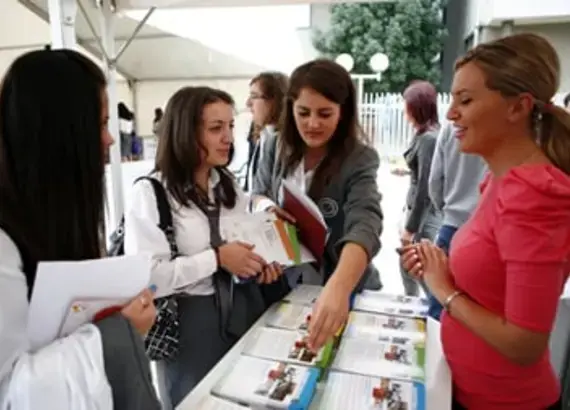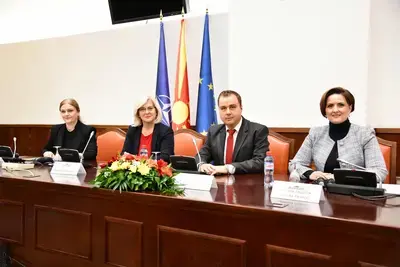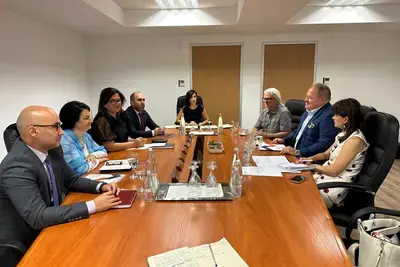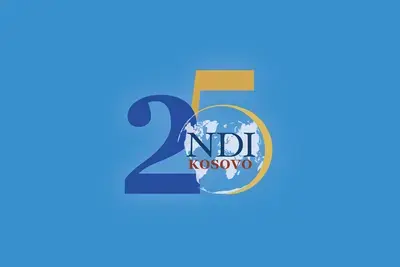
Success Story
Kosovars Celebrate Democracy Day with Greater Citizen Engagement
Citizen participation as a centerpiece of Kosovo's democracy was the theme of a week-long series of International Day of Democracy (IDD) events held in Pristina last month. Kosovars from a wide variety of ethnic communities attended the events, and most expressed an eagerness to learn about, and participate in, the legislative process.
The government of Kosovo joined with civil society organizations in the celebration, which featured an open house by parliament with tours of the assembly, speeches by members of parliament (MPs) and a documentary highlighting the assembly's history and progress in the two years since Kosovo's independence. An information fair sponsored by nongovernmental organizations connected civil society with MPs, building relationships for future collaboration on legislation and government oversight.
The occasion was the Sept. 15 International Day of Democracy, declared by the United Nations in 2007 as a day when citizens and governments around the world recognize the importance of human rights, the rule of law and other principles that unite democracies around the world.
The Assembly of Kosovo, in partnership with NDI, invited citizens, civic groups and members of parliament to recognize the role each plays in building representative institutions in one of the world's youngest democracy.
President of the Assembly Jakup Krasniqi hosted the many citizens and organizations who participated in IDD events, while taking the opportunity to remind Kosovars of the progress made over the past few years. "Democracy," he said in his welcoming address, "is the realization of freedom for all. To appreciate democracy means accepting the diversity in society and respecting the values and interests of different groups within it."
"Democracy is a long-term process," said Robert Benjamin, NDI regional director for central and Eastern Europe, who welcomed Kosovars to the events along with Krasniqi. More than 350 high school students arrived in Pristina from throughout the country to tour the assembly chambers and share their views on Kosovo's economic development and educational system with their elected officials.
"Kosovars have accomplished a lot, and they recognize there is still much to do. More people need to participate in politics in more ways, more often, with more views expressed about what should be done," Benjamin said. "And political institutions, from the government to the Assembly to political parties, need to open themselves to this participation."
NDI also hosted a reception to recognize the inspiring individual stories of leaders, organizers and activists who, over the last 10 years, have demonstrated remarkable dedication to building the young country's democratic institutions.
Other events included a discussion at the American University of Kosovo on the role of the international community in transitions to democracy and a policy briefing exploring the role of parliament in a democracy. The briefing showcased regional parliamentary models and inspired discussion among MPs, joined by colleagues from Albania, on best practices on the technical structure of a legislature.
As Kosovo seeks greater European integration, the Kosovo Assembly has been reaching out to other legislative bodies and welcomed officials of the Northern Ireland Assembly to its IDD events. They discussed areas of potential cooperation. Northern Ireland's history of sectarian strife and continuing reconciliation serves as a useful example for government leaders in Kosovo, as they continue to work with the country's Serbian minority toward greater peace and unity.
NDI launched its Kosovo Assembly Strengthening Program (KASP) in August 2009 to help the Assembly increase its research capacity, improve day-to-day operations, facilitate civil society participation in the legislative process, and exercise its oversight role, all while becoming more transparent and accountable to the public. NDI collaboration with the Assembly includes enhancing its information technology, supporting the efforts of women parliamentarians, and working with individual caucuses, including minority MPs. NDI also supports political parties, democratic elections and the participation of young people in local politics. NDI programs in Kosovo are funded by the U.S. Agency for International Development and the National Endowment for Democracy.
Related:
Pictured above: A parliamentary intern distributes brochures on the work of the Assembly of Kosovo to visiting high school students.
Published on October 1, 2010



